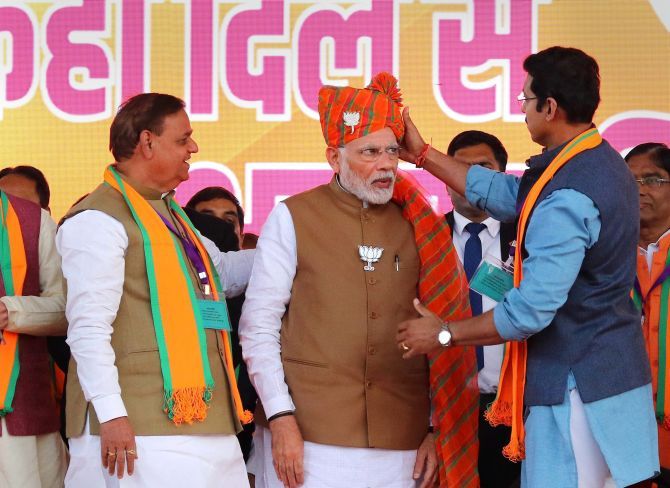'You look with hope at a politician who comes along and promises to change all that: 10 million new jobs every year, no need to touch someone's feet to get an introduction to an employer. And fix the corrupt guys who have made the system what it is.'
'But five years later, the reality has changed little or not at all,' says T N Ninan.

By general consensus, the economic issues that have brought down three Bharatiya Janata Party governments are farmer distress and the lack of jobs. The two are linked, of course.
If youngsters could get jobs in offices and factories, there would be fewer people trying to make their living on unviable farms, and their wages would supplement family incomes. But factory jobs are hard to come by, and English-speaking upper castes monopolise offices.
If you migrate to the city, life is hard. Villagers in cities work on construction sites: The experienced and those with some training become masons and fitters, or carpenters and electricians. Many work as poorly-paid watchmen, or as drivers. Their wives are either back home in the village, or work as domestic help in the city.
The men share single-room sleeping quarters, walk to work because a bus fare is unaffordable, and live on surprisingly little, managing to send money periodically to their families.
Every once in a while, they borrow from their employers or get money through an informal pooling scheme to repay a marriage loan for which the farm has been mortgaged or to build a room in a city slum, one step at a time: First pucca walls of brick to replace mud, two years later a proper roof to replace tin or asbestos, and still later a proper floor. The process can take a decade, with loan instalments a monthly reality.
Even with such bare-bones existence, capital accumulation takes place in the city, not in the village.
The lucky ones manage eventually to give their children a post-school diploma so that they can aspire to jobs one or two notches higher up the ladder -- as car mechanics, hotel housekeeping staff, delivery boys, or someone's gofer.
Young women may get to stand behind a shop counter, or find work in a mid-market boutique. Aspiring for more than that yields only frustration because their spoken English does not measure up.
They are mostly at the mercy of their employer -- without job security or medical cover. The official minimum wage is usually fiction.
Life is 'solitary, poor, nasty, brutish and (often) short', as Hobbes put it. And so any government job is better than almost any open market job: The pay is better, you belong, and there will be a pension.
But the government has started cheating by contracting out work or hiring only temp staff -- temp in name because they are engaged for years together.
Trapped in this reality, you look with hope at a politician who comes along and promises to change all that: 10 million new jobs every year, no need to touch someone's feet to get an introduction to an employer. And fix the corrupt guys who have made the system what it is.
But five years later, the reality has changed little or not at all.
If someone now starts an agitation for job reservations, especially for your caste, you go to the rally or join a procession in the hope that something will change.
If a party promises to write off your loan, it gets your vote. But you still have an unviable farm and no certainty about a good price at harvest time; and reservations don't deliver many jobs.
Bertrand Russell observed that most men live lives of quiet desperation. But the young are not given to resignation. So what do you do in what Katherine Boo has called the under-city, from where the comforts and pleasures of the over-city lie across an unbridgeable chasm?
Group identity could give your life more meaning, so you find your way to the fringes of the political world. Perhaps join a gang on the look-out for cattle traders (there is religious sanction, and also money to be made from seizing cattle -- or emotional release in beating up someone).
We can blame them, but what does our politics have to offer them? So we have what Swaminathan Aiyar has called a part of the 'New Delhi consensus': Subsidies and hand-outs in the hope that these will buy votes and keep people quiet.
The harsh fact is that India's political economy has only palliatives to offer, no real solutions.












 © 2025
© 2025